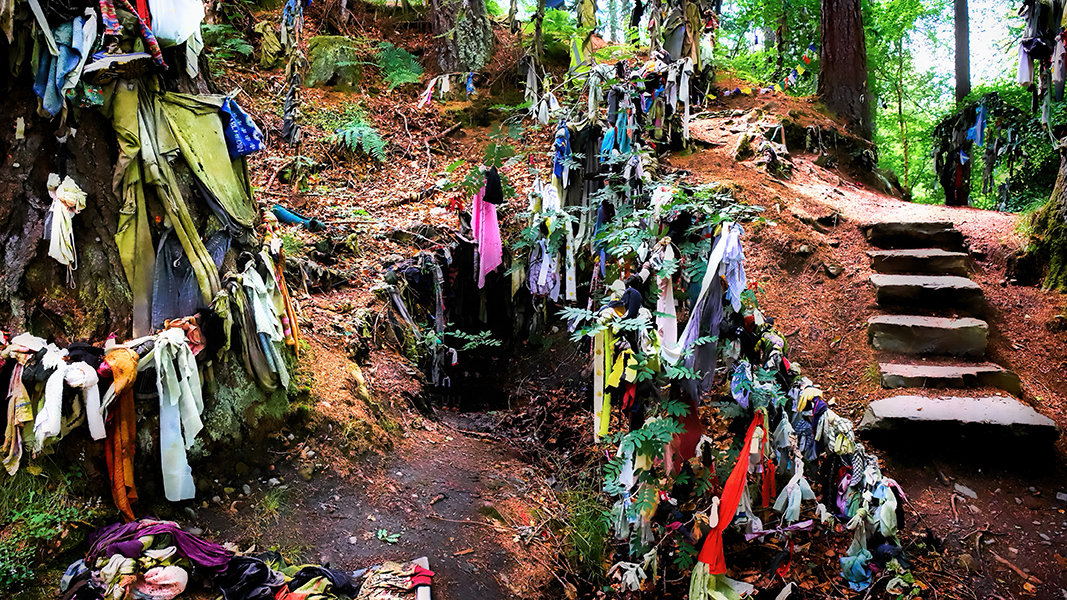It’s a bright July day. We’re driving back from Rosemarkie Beach when you ask, ‘Have you ever seen a clootie well?’
I’m certain you know I haven’t. I’m a Londoner who grew up in the wide spaces of the American Midwest. You’re an English ecologist inhabiting the Scottish Highlands. We met by chance and now I travel up to see you as often as I can. Let you woo me with the beauty of the Highlands — its fairie pools and castle ruins, its myths of monsters in lochs. You also reveal its history — its Pictish stones, chambered cairns and hidden henges. And today, a clootie well.
‘There’s a big one here on the Black Isle, along the old Cromarty and Fortrose road,’ you say. ‘It’s considered a healing place. The Munlochy Clootie Well.’
You explain that the Celts — or possibly the people before the Celts — travelled to the site with a ‘cloot’, a strip of cloth belonging to a sick loved one. They’d dip the cloot in water from the well, then hang it in a nearby tree. As the cloth rotted and faded away, so too would the illness.
‘That’s the idea,’ you say. ‘The belief.’
We drive further into woodland and I chuckle at the nonsense notions people used to hold. You smile and shrug, tell me to watch for a sign. I think you mean a road sign, but then I see the trees.
‘The thing is,’ you say as we turn off the main road. ‘People still believe.’
We park in deep shade. Goose bumps appear on my bare arms in the cool air and I shiver. A worn footpath meanders up a gentle hill packed with toothpick-thin trees. Here, at the car park, a few grey rags hang from the trees. You hold out your hand to me.
‘Wait until you see the well.’
As we walk, the strips of cloth multiply. Grow to garment size. White, knee-high socks, long woollen scarves and colourful bandannas are all tied tight to slender branches. A high-vis vest flaps from the lowest limb of a tall tree. Torn tie-die t-shirts stretch around skinny trunks. Bushes are draped with denim jeans. Tennis shoes swing and sweaters sway. Some of the pieces are too worn or dirty to identify, but every tree, bush and sizable branch is covered. I stop and gawp at the clutter while you carry on.
A small spring feeds the well. Here, different objects rest on smooth wet stones: soggy stuffed toys, slime-coated dolls, rotting baby booties. The intimacy of the items makes me shudder. It feels wrong to speak. You slow as we approach the well. It’s small — not so much a well as a moss-encrusted oblong sink sitting on the ground. Half-burnt water-logged candles surround its flat rim. I bend to study moulding rain-stained photos propped against its four short sides.
I feel it then. Strong. The fug of sickness, sadness and suffering that lives here in the trees.
‘A church once stood at the top of the hill,’ you say in a hushed tone even though there’s no one around. We’re next to a busy road, but it feels like we’re sealed inside a bubble. Traffic and birdsong are muffled sounds. Weak sunlight filters between the trees and debris. A smell of something other than damp permeates.
‘Does it work?’ I ask. You’re examining a young tree bent nearly in half with clootie weight.
Your gaze moves to me. ‘What do you think?’
I turn back to the well. Push back images of desperate people hoping well-water and cloth saves lives.
‘There’s been calls for the authorities to clear away the cloots. These modern ones won’t disintegrate. But it’s extremely bad luck to remove a cloot. So they say. So they stay.’
I shiver then. I’m ready to go. I don’t want to absorb the press of distress that clings to the trees of this eerie place. I’m letting my imagination run wild. The underlying smell here isn’t despair mixed with hope. I want to return to the light. To the bright summer day.
‘Surely cloots are a joke now,’ I say.
‘Yeah. Ha-ha,’ you say, gesturing to the strangled trees.
*
I move to the Highlands and we remain in love. We often drive past the clootie well and sometimes we stop. It’s a curiosity to show visiting friends. I go along — marvel and gape at all the detritus hanging in the trees. Giggle a bit and like the posted pics. Agree it’s silly to believe that hanging rags in trees can help anything.
I plan to drop by again soon — quite soon — in case the doctors can’t sort out your tumorous eye. I’ll go alone, at dusk — the magic time. Before I go, I’ll take a strip of cloth from a fraying t-shirt, maybe your Jimi Hendrix one. Then I’ll make my way alone to the Black Isle, along the old Cromarty and Fortrose road. I won’t need the road sign to know where to turn and I won’t smile or laugh or joke as I dip your cloot in the cool dark well, whisper a wish that sounds a lot like an awkward prayer, and tie my hope to a tree.
Originally from Missouri, Sherry Morris (@Uksherka) writes prize-winning flash fiction and short stories from a farm in the Scottish Highlands where she pets cows, watches clouds and dabbles in photography. She participated in the BBC Scottish Voices development programme and is supposed to be finishing her script. Her first published story was about her Peace Corps experience in Ukraine. She is a Northwords Now Board Member and reads for the wonderfully wacky Taco Bell Quarterly. More of her work can be found on www.uksherka.com

